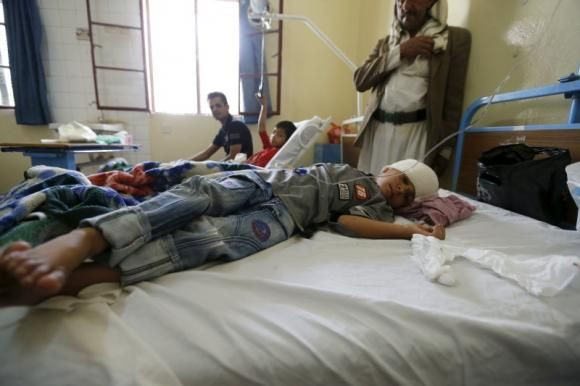Yemeni President Demands Houthis Quit Sanaa Amid New Fighting

(Reuters) - Yemeni President Abd-Rabbu Mansour Hadi on Saturday accused the Iranian-allied Houthi militia that controls the capital Sanaa of staging a coup against him, and said he would "raise Yemen's flag" in the Houthis' northern stronghold.
In a call to arms from the southern city of Aden, where he fled last month after escaping house arrest by the Houthis, Hadi called on them to pull their forces out of state ministries, return weapons seized from the army, and quit Sanaa.
"We shall deliver the country to safety and raise Yemen's flag on Mount Marran in Saadeh instead of the Iranian flag," he said in a televised speech, his first since reaching Aden. Iran is an ally of the Houthis, who belong to a Shi'ite Muslim sect.
The Houthis, in a statement from their Supreme Revolutionary Committee, did not directly respond to the speech but called for a "general mobilization" of the armed forces against a "dirty war" they said was being waged by militias loyal to Hadi.
Yemen has been hurtling towards civil war since last year when the Houthis seized Sanaa and advanced into Sunni areas, leading to clashes with local tribes and energizing a southern separatist movement.
Hadi's flight to Aden has raised the prospect of armed confrontation between rival governments based in the north and south, creating chaos that could be exploited by the Yemen-based regional wing of al Qaeda.
Fighting is spreading across the country, and 137 people were killed on Friday in the bombings of two Shi'ite mosques in Sanaa. They were claimed by Islamic State, an al Qaeda offshoot that controls large swathes of territory in Iraq and Syria and said it was also behind an attack that killed 23 people in Tunisia on Wednesday.
CALL FOR PEACE TALKS
Hadi held open the door to a negotiated settlement with a call for the Houthis and other groups to attend peace talks in Saudi Arabia.
He said Yemen must return to the political situation in place before the Houthis took control of Sanaa, restoring its constitution and implementing the results of a national dialogue process and Gulf-sponsored political transition.
In his speech, he denounced the Houthis as "coup plotters" and said he wanted to confront sectarianism. Addressing Houthi accusations that he planned to back a southern secessionist movement, he said his flight to Aden had been intended to preserve the country's unity.
Unidentified warplanes have bombed Hadi's Aden headquarters in recent days, and on Saturday forces loyal to the former president, Ali Abdullah Saleh, who is now allied to the Houthis, moved units to Taiz, 150 km (100 miles) northwest of Aden.
In a reflection of the deteriorating security situation, Washington was withdrawing the last 100 of the special forces troops it had deployed to Yemen to conduct operations against al Qaeda and allied groups, CNN reported, citing sources in the region.
Washington has been waging a drone war against the militants, who have alarmed Western and Gulf countries with their efforts to bomb international airliners and launch cross-border raids into top oil exporter Saudi Arabia.
On Friday, al Qaeda militants killed 20 soldiers during a brief occupation of al-Houta, the capital of Lahj province, which is only 30 km (20 miles) from Aden, before being driven back by the army.
There were also clashes between the Houthis and local tribes in the oil-producing area on the border of the Marib and al-Bayda provinces, which left 12 dead, according to tribal sources. Gunmen fired on anti-Houthi protesters in Taiz on Saturday, but no casualties were reported.
Later on Saturday, Hadi appointed health minister Riyadh Yassin as acting foreign minister, Al Jazeera news reported.
(Additional reporting by Mohammed Ghobari and Omar Fahmy in Cairo.; Writing by Angus McDowall in Riyadh; Editing by Kevin Liffey and Mark Trevelyan)
© Copyright Thomson Reuters 2024. All rights reserved.





















